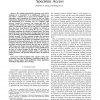Free Online Productivity Tools
i2Speak
i2Symbol
i2OCR
iTex2Img
iWeb2Print
iWeb2Shot
i2Type
iPdf2Split
iPdf2Merge
i2Bopomofo
i2Arabic
i2Style
i2Image
i2PDF
iLatex2Rtf
Sci2ools
148
click to vote
JSAC
2008
2008
Optimal Competitive Algorithms for Opportunistic Spectrum Access
We consider opportunistic spectrum access (OSA) strategies for a transmitter in a multichannel wireless system, where a channel may or may not be available and the transmitter must sense/probe the channel to find out before transmission. Applications for this work include joint probing and transmission for a secondary user in a cognitive radio network. Limited by resources, e.g., energy and time, the transmitter must decide on a subset of a potentially very large number of channels to probe and can only use for transmission those that have been found to be available. In contrast to previous works, we do not assume the user has a priori knowledge regarding the statistics of channel states. The main goal of this work is to design robust strategies that decide, based only on knowledge of the channel bandwidths/data rates, which channels to probe. We derive optimal strategies that maximize the total expected bandwidth/data rate in the worst-case, via a performance measure in the form of a ...
Related Content
| Added | 13 Dec 2010 |
| Updated | 13 Dec 2010 |
| Type | Journal |
| Year | 2008 |
| Where | JSAC |
| Authors | Nicholas B. Chang, Mingyan Liu |
Comments (0)

